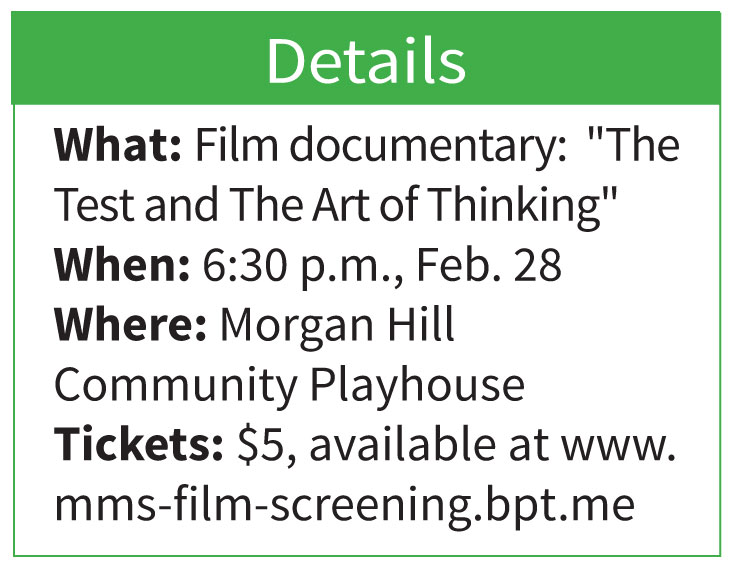Published in the February 13 – 26 2019 issue of Morgan Hill Life


Shannon Kelly
Each year more than three million high school students take the SAT or ACT, the entrance exams required by most four-year colleges in the United States.
For decades, however, there have been questions about exactly what these tests measure, what role they play in the admissions process and how predictive they are of academic success. These anxiety-provoking exams, and the multibillion-dollar test-prep industry that has grown up around them, have also become lightning rods in the ongoing national debate over equity in educational opportunity.
The documentary “The Test & the Art of Thinking” examines this controversy through interviews with students, parents, counselors, test-prep professionals and academics, to provide a look at this uniquely American rite of passage and how it reflects deeper issues in our educational system — and our society as a whole.
In the film, Chris Ajemain, founder of CATES Tutoring, likens the test to a work of art: “The SAT is not a test of what you know,” he said. “It’s a test of how you think.”
“There was always this sort of idea that it was me against the Scantron,” said Milo, a Harvard University student interviewed for the film. “If I can bubble in the right things, then I’ll make it in the world.”
Marisela Gomez of Inspired Education encourages parents to understand your child’s needs in relation to entrance exams and then create a test plan that works for your child. An independent consultant who works with high school students and their families in South County, she will participate in a discussion following the screening.
“There are several colleges that are now test-optional,” she said. “If your child has high-anxiety around test taking, consider approaching the college admission process differently. There are many ways to get admitted to college.”
As a college counselor, I am dedicated to helping students navigate the application process and I want them to explore the options that are available
The SAT and ACT, however, are like the story of the emperor who has no clothes: we understand that doing well on these exams has no bearing on college success, yet we are all forced to participate in the farce. I hope this film will open up the discussion and how these tests impact students and our entire education system.
“As a parent of three teenage children, one graduating high school this year and two others closely following, our family has been navigating the world of standardized testing — SATs, PSATs, ACTs, subject tests and more,” said local parent Beth Brennan. “I am glad to see some thoughtful research and attention being given to what the results of these test mean. After my elder son’s last planned SAT he expressed relief that the ‘testing’ was over. That started an interesting family discussion about how in many careers and jobs the testing will not be over. Standardized testing has always been part of an attempt to ensure a basic knowledge of, and proficiency in, the subject you are testing for. But how well do these tests reflect how we apply our knowledge to achieve a desired outcome? Not so well it appears.
“It’s clear some of us are very good ‘test takers,’ while others, for multiple reasons, will perform poorly, while demonstrating exceptional ability in applying knowledge in real-life situations.”
When the SAT was introduced in the 1920s, it was proposed as a way for elite universities to identify educationally disadvantaged students who would make promising scholarship candidates. That’s a far cry from its current status as a nearly ubiquitous exam for which affluent families pay thousands for classes and tutors to give their children any possible advantage.
Alexis, a high school senior, described the financial burden of test prep for her family: “They’re investing in your future,” she said. “But I don’t know if I’m that good of an investment.”
As parents and educators, we must ask ourselves, what is at stake when access to the test and test prep tutoring is prohibitively expensive for students and their families? What does this concern highlight about the nature of the test, and about the nature of the college admissions process?
“The test has become a gatekeeper,” said Dr. Susan A. Cole, president of Montclair State University. “And it is doing, in effect, the very opposite of what it has been intended to do.”
Shannon Kelly is the director of Upper School and college advisor for Mount Madonna School. MMS is an independent nonprofit school serving students preschool through grade 12.






